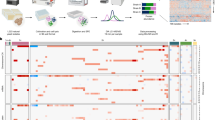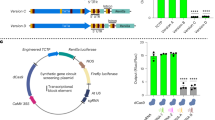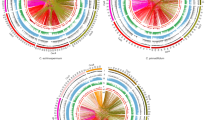Abstract
THE origin of physiological races of fungi causing plant diseases has been attributed to sexual and para-sexual recombination, adaptation and mutation. Wliere pathogenicity depends on the action of several genes, recombination results in new physiological races. Where pathogenicity on a given host depends on a single gene, changes in host specificity can only arise by point changes within the gene as distinct from recombination.
This is a preview of subscription content, access via your institution
Access options
Subscribe to this journal
Receive 51 print issues and online access
$199.00 per year
only $3.90 per issue
Buy this article
- Purchase on Springer Link
- Instant access to full article PDF
Prices may be subject to local taxes which are calculated during checkout
Similar content being viewed by others
References
Lincoln, R. E., and Gowen, J. W., Genetics, 27, 441 (1942).
Day, P. R., Ph.D. thesis, University of London (1954).
Flor, H. H., Science, 124, 888 (1956).
Day, P. R., Microbiol. Genet. Bull., 9, 6 (1954).
Harland, S. C., Third Bateson Lecture, John Innes Horticultural Institution (1955).
Author information
Authors and Affiliations
Rights and permissions
About this article
Cite this article
DAY, P. Mutation to Virulence in Cladosporium fulvum . Nature 179, 1141–1142 (1957). https://doi.org/10.1038/1791141b0
Issue Date:
DOI: https://doi.org/10.1038/1791141b0
This article is cited by
-
A biochemical mechanism for the gene-for-gene resistance of tomato to Cladosporium fulvum
Netherlands Journal of Plant Pathology (1971)
Comments
By submitting a comment you agree to abide by our Terms and Community Guidelines. If you find something abusive or that does not comply with our terms or guidelines please flag it as inappropriate.



